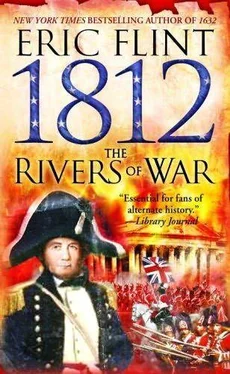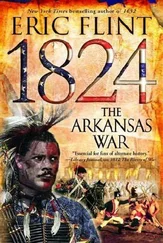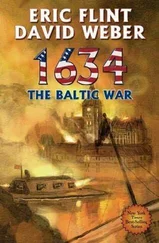Eric Flint - 1812 - The Rivers of War
Здесь есть возможность читать онлайн «Eric Flint - 1812 - The Rivers of War» весь текст электронной книги совершенно бесплатно (целиком полную версию без сокращений). В некоторых случаях можно слушать аудио, скачать через торрент в формате fb2 и присутствует краткое содержание. Жанр: Альтернативная история, на английском языке. Описание произведения, (предисловие) а так же отзывы посетителей доступны на портале библиотеки ЛибКат.
- Название:1812: The Rivers of War
- Автор:
- Жанр:
- Год:неизвестен
- ISBN:нет данных
- Рейтинг книги:4 / 5. Голосов: 1
-
Избранное:Добавить в избранное
- Отзывы:
-
Ваша оценка:
- 80
- 1
- 2
- 3
- 4
- 5
1812: The Rivers of War: краткое содержание, описание и аннотация
Предлагаем к чтению аннотацию, описание, краткое содержание или предисловие (зависит от того, что написал сам автор книги «1812: The Rivers of War»). Если вы не нашли необходимую информацию о книге — напишите в комментариях, мы постараемся отыскать её.
1812: The Rivers of War — читать онлайн бесплатно полную книгу (весь текст) целиком
Ниже представлен текст книги, разбитый по страницам. Система сохранения места последней прочитанной страницы, позволяет с удобством читать онлайн бесплатно книгу «1812: The Rivers of War», без необходимости каждый раз заново искать на чём Вы остановились. Поставьте закладку, и сможете в любой момент перейти на страницу, на которой закончили чтение.
Интервал:
Закладка:
Driscol cleared his eyes just in time to see a bayonet slide into John Rogers's belly. Moving as if time were slowed, the blade slid all the way through and emerged from his back, just above the waist.
Staring at the blood spilling off the tip of the bayonet, Driscol knew that John Rogers was a dead man. Even if no vital organs had been pierced-which was almost impossible, given the location-he'd die of infection from that sort of abdominal wound.
John knew it himself. The redcoat started to pull the blade out, but John grabbed the barrel of the musket with his left hand and held the bayonet where it was, with an iron grip.
Then, screamed. Not words. Just an incoherent cry of pain and rage that was enough to galvanize his body and spirit for one last strike.
The enemy soldier was too stunned by the sight to think of dropping his weapon. So his head was still within range, when John's war club came around like the scythe of doom.
The soldier died twice, since James crushed the other side of his skull as he fell to the ground. Then, looking at his brother, collapsed on the ground with the bayonet still held in his body by that final grip, he issued a scream of his own. The sound was so loud and so piercing that it froze, momentarily, the four British soldiers who were still coming toward him.
Driscol drove to his feet, the saber back in his hand, and went at one of them. Before he could get there, Henry Crowell had swatted the redcoat away.
He went for a second. But some Indian-Major Ridge, he thought-was there to cut him down.
The third, then. But that redcoat was already turning to face a new threat. Before he could get his bayonet into position, Sam Houston's sword went into his throat.
There was still a last. But he was surrendering, now, dropping his musket and raising his hands.
James Rogers was standing not more than six feet in front of him. He screamed again, leaping forward-a panther would have envied that scream-and shattered the man's skull.
There was nothing to cover the grief. No last deathblow that might remove the pain.
Staggering a little, more from sorrow than weariness, Driscol came over to John and dropped beside him on one knee.
Rogers was still alive, although Driscol could tell that he was going fast.
Still, he had enough life left to give Driscol a sly little smile.
"Know anything about Cherokee ghosts?" John asked, half whispering and half choking out the words. Blood was oozing from his mouth.
Numbly, Driscol shook his head.
"You don't want to, either. So you be good to my sister, or I'll haunt you."
His brother was kneeling next to him now, on the other side.
"You heard?" John whispered.
James nodded. Patrick thought that, from the dull expression on his face, James felt as numb as he did.
John smiled, then, and closed his eyes. He started to say something else, but died halfway through the second word.
Driscol thought the word was "forget," although he wasn't sure. The first had been "don't."
Sam swallowed, and looked away. He remembered the first time he'd ever seen John Rogers, on John Jolly's island. John and his brother had been swimming in the river. They'd both looked like seals, so swift they were.
Remembering, suddenly, that he was the commanding officer, Sam gave the area a quick and nervous inspection, his eyes ranging everywhere.
But there was no danger, not any longer. That group of British soldiers who went after Driscol and the Rogers brothers had been the last gasp of the assault. Their mates had already been falling back while it happened.
There were no British soldiers left in the bastion. None who were alive and uninjured, at least. There were quite a few corpses and wounded men.
Henry Crowell came up to him, still holding the sponge staff he'd used as a maul. "Sorry about your friend, Colonel."
"Yes. Thank you, Henry."
Sighing, Sam started to sheath the sword. Then, realized it was covered with blood. For a moment, he looked down at the corpse of the man whose blood it was, wondering if he could wipe it clean on his uniform.
But that would be just… horrid.
"Here, sir," Henry said softly. Looking, Sam saw that Crowell was extending the end of his sponge staff. "This'll do, well enough."
So it did.
With the sword finally sheathed, Sam went over to the breastworks. Henry came with him. They had to move three corpses aside to clear a good view. Two enemy, one of their own.
They did the work rather gently. Sam could have clambered onto the bodies, the same way he had when he came into the bastion. But now that the battle was over, that seemed unbearably wicked.
The enemy was leaving the field, moving back toward the barges that had ferried them across the river.
All of them. Gauging the numbers as best he could, Sam estimated that at least two-thirds of the British soldiers would make their escape. But those were the broken pieces of regiments, now, no longer fighting units. They weren't racing away in a rout, the way the Kentucky militiamen had done at the start of the battle. But they weren't maintaining much in the way of formation, either. Those were soldiers who'd been beaten, and beaten badly enough that they wouldn't be fighting any more this day.
"Do you think it's over, sir?" asked Henry. "I mean the whole thing."
Sam shrugged. "Your guess is as good as mine. But since we're guessing… Yes. I think it's over. If we could beat them back here, why would they ever think they could get across the field at Chalmette?"
The only man who really mattered, at the moment, was the one man who didn't have to guess.
Pakenham sighed, when he saw the Forty-third and the West Indians join the Eighty-fifth in its retreat. "Robert was right," he said, speaking very softly. He was really just talking to himself.
Ignoring his cluster of aides, Pakenham left the riverside and strode to a place where he could look out over Chalmette field.
He'd always known the danger of that clear, open field. But now, having witnessed that horrible American artillery in full action, and the determination of the soldiers behind the guns, he could see it as it would be. Covered with the corpses of his soldiers. A carpet of redcoats from one end to the other.
We'd have lost two thousand men, I think, before we were driven back. And I doubt we'd have inflicted more than a hundred casualties on the enemy.
No reputation is worth such a cost.
He even managed a wry little smile. In all likelihood, it'd have been a posthumous reputation anyway. Here lies the gallant fool, Major General Edward Pakenham, Knight of the Bath.
Admiral Cochrane came up. Pakenham gave him a cold, hard glance.
"There will be no battle on Chalmette field, Admiral. I'll start pulling out the men tomorrow morning."
Cochrane nodded. The admiral was too smart a man not to realize that he'd pushed the army as far as it would go.
"Yes, I understand. I was thinking… We might finally catch Jackson napping, you know. If we move fast."
Pakenham chuckled. "You're quite a good strategist, Admiral. So long as you'll agree to leave the tactics to me. Yes, I was thinking the same thing myself all morning, as I punished an innocent tree. By all means. Let us give Mobile another try."
After the silence had lasted long enough, Robert Ross left the square to deal with his bladder. When he came back, hearing the silence still, he ordered another pot of tea. Tiana was back at the table.
"Would you care for some, my dear?"
"No." She was finally starting to cry. "I think he's dead."
"I think he's very much alive. That's what that silence means."
It meant something else, too; little to Tiana but a very great deal to Robert Ross. That silence-continuing, and continuing-meant that thousands of his men would live to see another day, with all their limbs and organs intact.
Читать дальшеИнтервал:
Закладка:
Похожие книги на «1812: The Rivers of War»
Представляем Вашему вниманию похожие книги на «1812: The Rivers of War» списком для выбора. Мы отобрали схожую по названию и смыслу литературу в надежде предоставить читателям больше вариантов отыскать новые, интересные, ещё непрочитанные произведения.
Обсуждение, отзывы о книге «1812: The Rivers of War» и просто собственные мнения читателей. Оставьте ваши комментарии, напишите, что Вы думаете о произведении, его смысле или главных героях. Укажите что конкретно понравилось, а что нет, и почему Вы так считаете.











